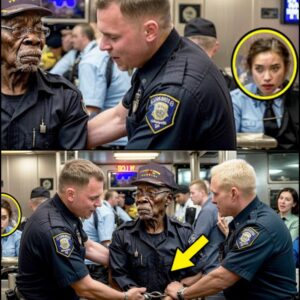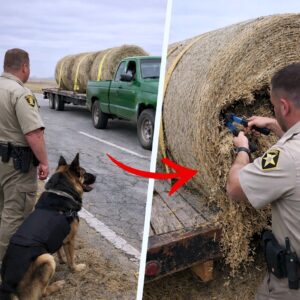Elliot Quinn wasn’t used to being stopped in the middle of his schedule. He was the kind of man whose days were measured in seconds, each one planned for meetings, calls, and profits. That icy winter morning, he was hurrying to his office after a quick espresso stop when a small figure appeared in his path.
At first, he thought it was just another beggar. But then he saw the boy — no older than nine, his face red from cold, his gloves mismatched, and his eyes too old for his small body.
“Whatever you’re selling, I’m not interested,” Elliot said flatly, checking his phone.
But the boy didn’t leave. Instead, he dropped to his knees right there on the snowy sidewalk, pulled out his shoeshine kit, and said softly, “Please, sir. Just ten dollars. I can work for it. I don’t want charity.”
That sentence — I don’t want charity — made Elliot look up. The boy’s voice trembled, but his hands moved with purpose. He started polishing Elliot’s black leather shoes, rubbing fast to keep his numb fingers warm.
“Why ten dollars?” Elliot asked without meaning to.
“For my mom,” the boy said, barely above a whisper. “She’s sick. Needs medicine today.”
Elliot followed the boy’s glance and saw a woman sitting against the café wall — thin, shivering, her head resting on her knees. His chest tightened, but he shook it off. “There are shelters,” he muttered.
The boy didn’t answer. He just kept working. And when he finished, the shoes looked perfect — cleaner than any service Elliot had ever paid for.
“Good job,” Elliot said, handing him a twenty.
The boy pushed half back. “You said ten.”
Elliot stared. “Keep it.”
The boy hesitated, then whispered, “Mom says we don’t take what we don’t earn.” He finally accepted the ten, bowed slightly, and ran to the woman — his mother — showing her the bill with a proud smile.
Elliot watched them from behind the glass of the café, the snow falling thicker around their small figures.
And for the first time in years, he couldn’t focus on his coffee, or his phone, or the billion-dollar deal waiting for him.
He just kept seeing that little boy polishing shoes in the snow — and realizing that maybe, he was the one who needed cleaning inside.
The next morning, Elliot Quinn did something completely out of character — he skipped his board meeting. The decision shocked even him.
He found himself standing again outside the same café, early enough that the streets were quiet except for the soft crunch of snow. And there they were — the boy and his mother.
The woman was coughing hard, holding her chest. Tommy — that was the boy’s name, he remembered — was trying to hand her a paper cup of coffee, his little face full of worry.
Elliot walked toward them. “Tommy,” he said gently.
The boy turned, startled — then smiled with recognition. “Sir! You’re back! I can shine your shoes again. Free this time!”
Elliot knelt so he was eye-level with him. “You don’t need to do that, son. Tell me about your mom. How bad is she?”
Tommy looked down. “She’s real sick, sir. Can’t breathe good. I tried to get her medicine yesterday, but it wasn’t enough. They said we need a doctor.”
Elliot looked at Grace — the woman — and saw that her lips were pale, her breathing shallow. “Why didn’t you go to the hospital?”
“She won’t,” Tommy whispered. “Says she doesn’t want charity.”
Grace looked up weakly. “We’ll manage,” she said hoarsely. “We always do.”
That was the moment something in Elliot broke. He remembered his own mother — working double shifts just to keep food on the table, refusing to ask for help even when she was sick.
He stood abruptly. “You’re not managing anything like this. Come on.”
Before Grace could argue, Elliot called for an ambulance. He ignored her protests, her tears, and Tommy’s confusion. When the medics arrived, Grace nearly collapsed in the snow.
Elliot followed them all the way to the hospital, signing papers, arranging payment, calling in favors. Pneumonia. Severe malnutrition. The doctor said if she’d waited one more day, she might not have survived.
That night, Elliot sat in the hospital hallway, watching Tommy asleep on a plastic chair, clutching his shoeshine rag like a blanket. The boy’s head rested on Elliot’s arm.
For the first time in years, Elliot didn’t care about the markets, the shareholders, or the next merger.
He just knew one thing — he wasn’t going to let this boy lose his mother.
Weeks passed. Grace slowly recovered, though she was weak at first. Elliot made sure she got the best care. He visited daily, always pretending it was “on his way to a meeting.”
One day, when Grace could finally stand, she looked at him and asked quietly, “Why are you doing all this? We’re strangers.”
Elliot smiled faintly. “Because once, someone should’ve helped my mother, too. But no one did.”
Grace tried to speak, but tears came instead.
When she was discharged, Elliot arranged a small apartment near the hospital — warm, clean, stocked with food. He paid for Tommy’s school and gave Grace a job at one of his companies. But he never made them feel indebted; he just checked in from time to time, like family would.
Tommy thrived in school. He loved to read, to draw, to tell Elliot about every little thing he learned. And Elliot — once the loneliest man in a glass tower — found himself waiting for those visits more than any business call.
One evening, Tommy asked, “Do you have a mom, Mr. Quinn?”
Elliot looked out the window. “I did,” he said softly. “She worked very hard. I didn’t help her enough.”
Tommy reached out and grabbed his hand. “Then I’m glad you helped mine.”
A year later, spring arrived. The city was alive again, no snow, just sunlight and laughter. Elliot sat outside Tommy’s school, watching the boy — now taller, healthier — run to him with a grin.
“Your shoes look dirty again,” Tommy joked, holding up his old shoeshine rag.
Elliot laughed. “Then you’d better get to work.”
Grace stood across the street, smiling proudly. Elliot waved back.
As Tommy polished his shoes, Elliot looked at his reflection on the shiny leather — not the same cold, tired man he’d once been, but someone lighter, alive.
He realized that wealth wasn’t about the skyscrapers he owned, or the power he held.
It was about one act of kindness that changed three lives — and polished a heart that had forgotten how to feel.





